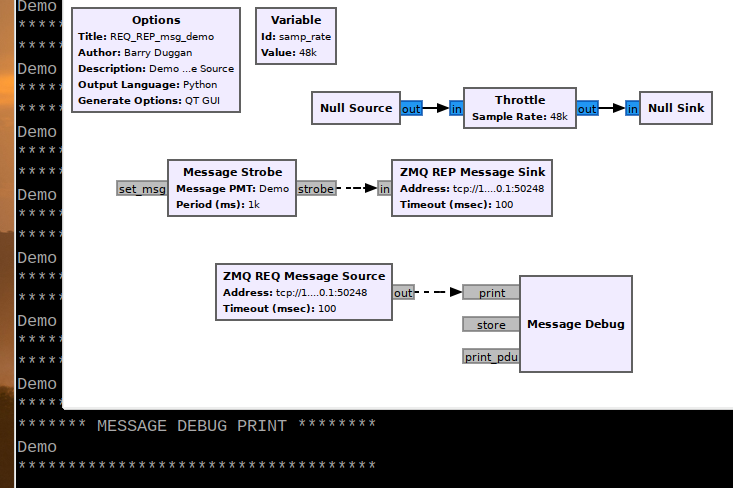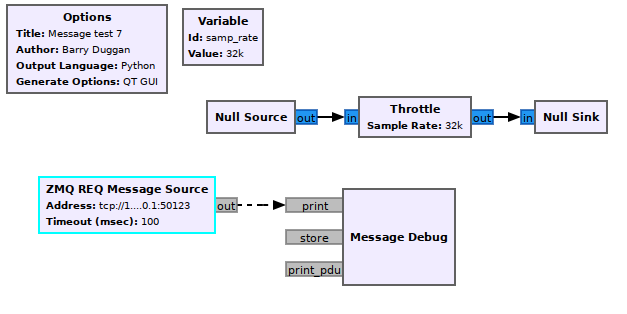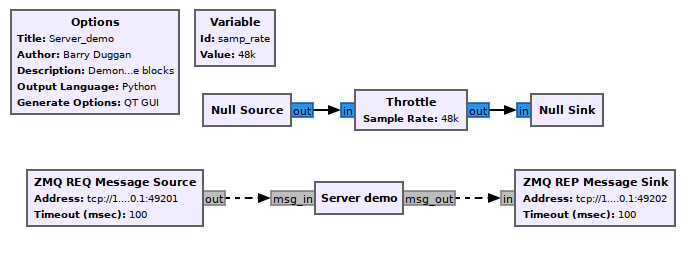ZMQ REQ Message Source: Difference between revisions
(add example flowgraph and Python code) |
|||
| Line 24: | Line 24: | ||
An external Python program can send messages to a ZMQ REQ Message Source block. An example flowgraph and Python code follow.<br> | An external Python program can send messages to a ZMQ REQ Message Source block. An example flowgraph and Python code follow.<br> | ||
[[File:Msg_test7_fg.png]] | |||
The Python client code looks like this:<br> | |||
<pre> | |||
#!/usr/bin/python3 | |||
# -*- coding: utf-8 -*- | |||
# zmqREP.py | |||
# | |||
# The REQest / REPly nomenclature of the GNU Radio message blocks is from | |||
# the perspective of the flowgraph. So, to send a 'request' to GNU Radio, the message | |||
# must be sent as a 'reply' from the Python client, Likewise, a 'reply' from GNU Radio | |||
# must be received as a 'request' to the Python client! Therefore, send on the reply socket | |||
# and receive on the request socket. | |||
# | |||
# The zeromq.org website says: | |||
# "The REQ-REP socket pair is in lockstep. The client issues zmq_send() and then zmq_recv(), | |||
# in a loop (or once if that's all it needs). Doing any other sequence (e.g., sending two messages in a row) | |||
# will result in a return code of -1 from the send or recv call." Likewise, the server "issues zmq_recv() | |||
# and then zmq_send() in that order, as often as it needs to." | |||
# | |||
# To conform to that requirement, a non-standard "kludge" is used (see below). | |||
import datetime | |||
import time | |||
import signal | |||
import pmt | |||
import zmq | |||
_debug = 1 # set to zero to turn off diagnostics | |||
# create socket | |||
_PROTOCOL = "tcp://" | |||
_SERVER = "127.0.0.1" # localhost | |||
_PORT = ":50123" | |||
_ADDR = _PROTOCOL + _SERVER + _PORT | |||
if (_debug): | |||
print ("zmqREP connecting to:", _ADDR) | |||
context = zmq.Context() | |||
if (_debug): | |||
assert (context) | |||
sock = context.socket (zmq.REP) | |||
if (_debug): | |||
assert (sock) | |||
rc = sock.bind (_ADDR) | |||
if (_debug): | |||
assert (rc == None) | |||
while True: | |||
_tim = datetime.datetime.now() | |||
_out = str (_tim) | |||
try: | |||
sock.recv() # this is the non-standard "kludge" | |||
sock.send (pmt.serialize_str(pmt.to_pmt(_out))) # send on the 'reply' socket | |||
time.sleep(5) | |||
except KeyboardInterrupt: | |||
if (_debug): | |||
print (" Interrupt received. shutting down.") | |||
# clean up | |||
sock.close() | |||
context.term() | |||
exit() | |||
</pre> | |||
=== GNU Radio as a server === | === GNU Radio as a server === | ||
Revision as of 00:36, 13 March 2020
The ZMQ REQ Message Source block receives messages from a ZMQ REQ socket and outputs async messages. This block will connect to a ZMQ REP Message Sink.
The zeromq.org website says:
"The REQ-REP socket pair is in lockstep. The client issues zmq_send() and then zmq_recv(), in a loop (or once if that's all it needs). Doing any other sequence (e.g., sending two messages in a row) will result in a return code of -1 from the send or recv call." Likewise, the server "issues zmq_recv() and then zmq_send() in that order, as often as it needs to."
Parameters
(R): Run-time adjustable
- Address
- ZMQ socket address specifier. The format of the address is
tcp://*:portwhere * should be 127.0.0.1 for localhost.
- Timeout
- Socket timeout in milliseconds, default is 100ms.
Example Flowgraph
Inter-flowgraph
Request/Reply pairs can be used on one, or two separate, flowgraphs to exchange messages.
External Python client (send only)
An external Python program can send messages to a ZMQ REQ Message Source block. An example flowgraph and Python code follow.
The Python client code looks like this:
#!/usr/bin/python3
# -*- coding: utf-8 -*-
# zmqREP.py
#
# The REQest / REPly nomenclature of the GNU Radio message blocks is from
# the perspective of the flowgraph. So, to send a 'request' to GNU Radio, the message
# must be sent as a 'reply' from the Python client, Likewise, a 'reply' from GNU Radio
# must be received as a 'request' to the Python client! Therefore, send on the reply socket
# and receive on the request socket.
#
# The zeromq.org website says:
# "The REQ-REP socket pair is in lockstep. The client issues zmq_send() and then zmq_recv(),
# in a loop (or once if that's all it needs). Doing any other sequence (e.g., sending two messages in a row)
# will result in a return code of -1 from the send or recv call." Likewise, the server "issues zmq_recv()
# and then zmq_send() in that order, as often as it needs to."
#
# To conform to that requirement, a non-standard "kludge" is used (see below).
import datetime
import time
import signal
import pmt
import zmq
_debug = 1 # set to zero to turn off diagnostics
# create socket
_PROTOCOL = "tcp://"
_SERVER = "127.0.0.1" # localhost
_PORT = ":50123"
_ADDR = _PROTOCOL + _SERVER + _PORT
if (_debug):
print ("zmqREP connecting to:", _ADDR)
context = zmq.Context()
if (_debug):
assert (context)
sock = context.socket (zmq.REP)
if (_debug):
assert (sock)
rc = sock.bind (_ADDR)
if (_debug):
assert (rc == None)
while True:
_tim = datetime.datetime.now()
_out = str (_tim)
try:
sock.recv() # this is the non-standard "kludge"
sock.send (pmt.serialize_str(pmt.to_pmt(_out))) # send on the 'reply' socket
time.sleep(5)
except KeyboardInterrupt:
if (_debug):
print (" Interrupt received. shutting down.")
# clean up
sock.close()
context.term()
exit()
GNU Radio as a server
If the GNU Radio flowgraph(s) is configured as a server, the REQ message is processed by the flowgraph and a message is sent back in a REP message as the response. An example flowgraph and Python code follow. Note that two different ports are used.
The Embedded Python block "Server demo" contains the following code:
from gnuradio import gr
import pmt
class my_sync_block (gr.sync_block):
# accepts message string from input port
# capitalizes the string
# sends message to output port
def __init__(self):
gr.sync_block.__init__(self,
name = "Server demo",
in_sig = None,
out_sig = None)
self.message_port_register_in(pmt.intern('msg_in'))
self.message_port_register_out(pmt.intern('msg_out'))
self.set_msg_handler(pmt.intern('msg_in'), self.handle_msg)
def handle_msg(self, msg):
inputText = pmt.symbol_to_string (msg)
# print (inputText)
if (len (inputText) > 0):
# capitalize the string
outputText = inputText.upper()
# print (outputText)
# Send reply back to client
self.message_port_pub(pmt.intern('msg_out'), pmt.intern(outputText))
def work(self, input_items, output_items):
# with no data ports, there is nothing to do
return (0)
The Python client code looks like this:
#!/usr/bin/python3
# -*- coding: utf-8 -*-
# zmq_REQ_client.py
#
# The REQest / REPly nomenclature of the GNU Radio message blocks is from
# the perspective of the flowgraph. So, to send a 'request' to GNU Radio, the message
# must be sent as a 'reply' from the Python client, Likewise, a 'reply' from GNU Radio
# must be received as a 'request' to the Python client! Therefore, send on the reply socket
# and receive on the request socket.
#
# The zeromq.org website says:
# "The REQ-REP socket pair is in lockstep. The client issues zmq_send() and then zmq_recv(),
# in a loop (or once if that's all it needs). Doing any other sequence (e.g., sending two messages in a row)
# will result in a return code of -1 from the send or recv call." Likewise, the server "issues zmq_recv()
# and then zmq_send() in that order, as often as it needs to."
#
# To conform to that requirement, a non-standard "kludge" is used (see below).
import datetime
import time
import signal
import pmt
import zmq
_debug = 1 # set to zero to turn off diagnostics
# create a REQ socket
_PROTOCOL = "tcp://"
_SERVER = "127.0.0.1" # localhost
_REQ_PORT = ":49202"
_REQ_ADDR = _PROTOCOL + _SERVER + _REQ_PORT
if (_debug):
print ("'zmq_REQ_client' connecting to:", _REQ_ADDR)
req_context = zmq.Context()
if (_debug):
assert (req_context)
req_sock = req_context.socket (zmq.REQ)
if (_debug):
assert (req_sock)
rc = req_sock.connect (_REQ_ADDR)
if (_debug):
assert (rc == None)
# create a REP socket
_PROTOCOL = "tcp://"
_SERVER = "127.0.0.1" # localhost
_REP_PORT = ":49201"
_REP_ADDR = _PROTOCOL + _SERVER + _REP_PORT
if (_debug):
print ("'zmq_REQ_client' binding to:", _REP_ADDR)
rep_context = zmq.Context()
if (_debug):
assert (rep_context)
rep_sock = rep_context.socket (zmq.REP)
if (_debug):
assert (rep_sock)
rc = rep_sock.bind (_REP_ADDR)
if (_debug):
assert (rc == None)
while True:
# generate an outgoing message
_tim = datetime.datetime.now()
_out = ("Local time is " + str (_tim))
try:
print(_out)
rep_sock.recv() # this is the non-standard "kludge"
rep_sock.send (pmt.serialize_str(pmt.to_pmt(_out))) # send on the 'reply' socket
time.sleep(1)
req_sock.send_string("\x01\x00\x00\x00") # this is the non-standard "kludge"
msg = req_sock.recv() # receive on the 'request' socket
print (pmt.to_python(pmt.deserialize_str(msg)))
time.sleep(4)
except KeyboardInterrupt:
if (_debug):
print (" Interrupt received. shutting down.")
# clean up
req_sock.close()
req_context.term()
rep_sock.close()
rep_context.term()
exit()
Source Files
- C++ files
- TODO
- Header files
- TODO
- Public header files
- TODO
- Block definition
- TODO


